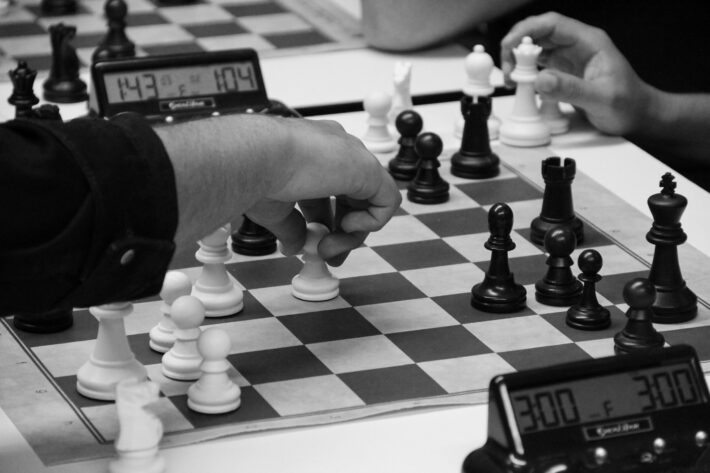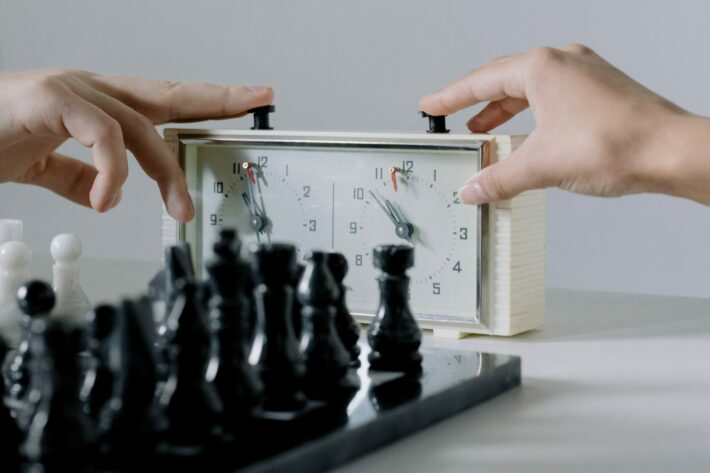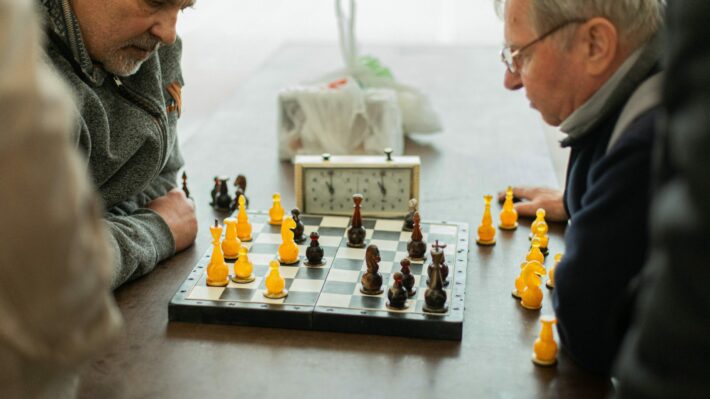Do you find yourself losing valuable time during a chess game? Are you struggling to manage your time effectively and make the most out of each move? If so, you may be making some common chess timer mistakes that are holding you back.
As we delve into the topic at hand, we’ll explore the important role of a chess timer and highlight the most common mistakes to avoid. Whether you’re a beginner or an experienced player, understanding these timer pitfalls can significantly improve your game strategy and overall performance. So, let’s dive into the world of chess timers and discover how to maximize your moves!
Is forgetting to hit the timer button costing you valuable time?
Forgetting to hit the timer button after making your move can be a costly mistake. Not only does it eat up your precious playing time, but it can also disrupt your focus and rhythm. Imagine executing a brilliant move, only to realize that you forgot to start the timer.
Your opponent gets a free pass to think and plan while the clock continues to tick against you. To avoid this error, develop a pre-move timer routine. Train yourself to hit the timer button immediately after making your move, ensuring that your time is accurately tracked and giving yourself a fair chance to strategize and respond.
| Mistake | Consequences | Solution |
|---|---|---|
| Forgetting to hit the timer | Loss of valuable time | Develop a pre-move timer routine |
| Improper timer placement | Difficulty tracking time | Position the timer where visible |
| Incorrect time controls | Unbalanced game progression | Familiarize yourself with time controls |
| Ineffective time management | Poor decision-making | Practice time management techniques |
| Overreliance on the opponent’s timer | Lack of control and strategy | Focus on your own time management |
How can improper timer placement affect your game strategy?

The placement of the chess timer may seem trivial, but it can have a significant impact on your game strategy. If the timer is not positioned correctly, it may become a distraction or hinder your visibility of the chessboard.
Placing the timer on the same side as your dominant hand is usually the best approach, as it allows for quick and easy access without interfering with your line of sight. Experiment with different positions to find what works best for you, ensuring that the timer doesn’t become a hindrance but a helpful tool in your chess battles.
Are you underestimating the importance of setting time controls correctly?
Setting time controls correctly is a fundamental aspect of chess that is often overlooked. Time controls dictate the amount of time each player has to make their moves, and they can significantly impact the pace and intensity of the game. Whether you’re playing with a fixed time per player or time increments, it’s crucial to understand and set the appropriate time controls for each game.
Failing to do so can lead to unbalanced game progression, putting you at a disadvantage or causing unnecessary time pressure. Familiarize yourself with different time control options and choose the ones that suit your playing style and goals.
What happens when you fail to manage your time effectively during a chess game?
Poor time management can be detrimental to your overall performance in a chess game. When you fail to manage your time effectively, you may find yourself rushing through moves or spending an excessive amount of time on insignificant decisions. This imbalance can lead to suboptimal moves, overlooked opportunities, and unnecessary stress.
To avoid this, practice time management techniques such as allocating a reasonable amount of time for each move, identifying critical moments that require deeper analysis, and learning to trust your instincts when time is running low. By managing your time wisely, you can make well-considered moves and maintain a calm and focused mindset throughout the game.
Are you falling into the trap of relying too heavily on your opponent’s timer?
It’s easy to fall into the trap of relying too heavily on your opponent’s timer. When your opponent’s time is ticking down, it’s tempting to use that as an opportunity to relax, gather your thoughts, or even take a mental break. However, this reliance can backfire.
Your opponent’s timer should never dictate your time management strategy. Instead, focus on your clock and use your allocated time wisely. Treat each move as an opportunity to analyze the position, plan, and make the best move possible.
Is there a right way and a wrong way to use time increments?
Time increments, also known as time bonuses or time delays, can be a game-changer when used correctly. These additional seconds or minutes added to your clock after each move can provide a valuable cushion for critical moments. However, using time increments indiscriminately can lead to complacency and inefficient use of time.
It’s essential to strike a balance between utilizing time increments strategically and not relying on them excessively. Use the additional time to contemplate complex positions, calculate variations, or handle unexpected challenges. Avoid becoming overly dependent on time increments and remember to maintain a steady pace throughout the game.
How can distractions impact your time management with a chess timer?

Distractions can have a significant impact on your time management with a chess timer. Whether you’re playing in a noisy environment, facing an unruly opponent, or dealing with internal distractions, maintaining focus is crucial. Distractions can lead to time-consuming mistakes, missed opportunities, and reduced concentration.
Minimize external distractions by choosing a quiet and comfortable playing environment. Practice mental techniques to stay focused, such as mindfulness or visualization exercises. By cultivating a calm and distraction-free mindset, you’ll be able to make the most out of your allotted time and optimize your decision-making process.
Are you neglecting to consider the psychological aspects of a chess timer?
Chess is not just a battle of pieces; it’s also a battle of minds. The psychological aspect of a chess timer plays a significant role in the game. Time pressure can induce anxiety, affect decision-making, and even lead to blunders.
On the other hand, effective time management can create psychological pressure on your opponent, forcing them to make hasty or ill-considered moves. Understanding these psychological dynamics can give you a strategic advantage. By managing your time confidently, maintaining a steady pace, and staying mentally resilient, you can exploit your opponent’s time trouble and enhance your overall gameplay.
What are the consequences of poor time allocation between moves?
Poor time allocation between moves can have severe consequences in a chess game. Spending excessive time on simple moves or rushing through critical decisions can lead to mistakes, missed tactics, and suboptimal performance. It’s important to strike a balance between thorough analysis and practical time usage.
Practice allocating your time according to the complexity of each position. Simple moves should be made efficiently, allowing you to dedicate more time to challenging and pivotal moments. By allocating your time wisely, you’ll optimize your decision-making process and improve your chances of success.
Are you making these common mistakes when pausing the timer?
Pausing the timer can be a necessary action during a chess game, but it’s essential to avoid common mistakes when doing so. Accidental pausing or forgetting to resume the timer can disrupt the flow of the game and create unnecessary confusion.
When you need to pause the timer, do it intentionally and ensure that you resume it promptly after attending to the matter at hand. Practice pausing the timer smoothly and without hesitation to minimize any potential disruption to your thought process or concentration.
How does excessive time pressure affect your decision-making ability?
Excessive time pressure can have a detrimental impact on your decision-making ability. When the clock is ticking down rapidly, it’s easy to feel overwhelmed, rushed, and prone to impulsive moves. Decision quality may suffer as a result, leading to blunders and missed opportunities.
To mitigate the negative effects of time pressure, it’s crucial to remain calm and composed. Train yourself to make quick, but well-calculated decisions by practicing time-limited puzzles and playing blitz or rapid chess. By building your decision-making skills under time constraints, you’ll become more resilient and adaptable in high-pressure situations.
Is it possible to recover from a time deficit during a chess game?

Being in a time deficit during a chess game can be daunting, but it’s still possible to make a comeback. When facing a time deficit, it’s crucial to maintain composure and adapt your strategy accordingly. Prioritize efficiency in your moves, focusing on finding the best practical solutions rather than perfection.
Look for opportunities to create time-saving tactics or induce your opponent into making mistakes under time pressure. Emphasize resourcefulness and practical play to level the playing field. By remaining resilient and strategic, you can turn the tide and make a successful recovery even when facing a time deficit.
Are you falling victim to the “flag fall” due to improper timer usage?
The “flag fall” is a term used to describe a situation where a player’s time runs out, resulting in an automatic loss. Improper timer usage can increase the risk of falling victim to the flag fall. Whether it’s due to forgetfulness, technical issues, or insufficient time management, allowing your clock to run out can be a frustrating and preventable mistake.
Avoid the flag fall by developing good timer habits. Always keep an eye on your remaining time, allocate it wisely, and ensure that you’re aware of any timer-related rules or settings specific to your chess tournament or game format.
Can you improve your overall chess skills by mastering your use of the timer?
Mastering your use of the chess timer can indeed enhance your overall chess skills. Effective time management is a vital aspect of the game that can influence decision-making, psychological dynamics, and game strategy. By avoiding common timer mistakes and developing good habits, you’ll gain a better understanding of time-related challenges in chess.
You’ll become more focused, resilient, and adaptable, enabling you to make better use of your allotted time and optimize your moves. Embrace the timer as a valuable tool in your chess journey, and it will become a powerful asset in your pursuit of mastery.
In Conclusion: Mastering Chess Timer Usage for Improved Performance
In the game of chess, time is a valuable resource that must be managed effectively. By avoiding common chess timer mistakes, such as forgetting to hit the timer button or relying too heavily on your opponent’s clock, you can maximize your moves and gain a strategic advantage. Proper timer placement, setting accurate time controls, and considering the psychological aspects of the timer are crucial elements in your chess strategy.
By allocating your time wisely, capitalizing on your opponent’s time trouble, and staying calm under time pressure, you can improve your overall chess skills and enhance your chances of success. Embrace the chess timer as a valuable tool, and let it guide you toward victory in your future battles on the chessboard.




